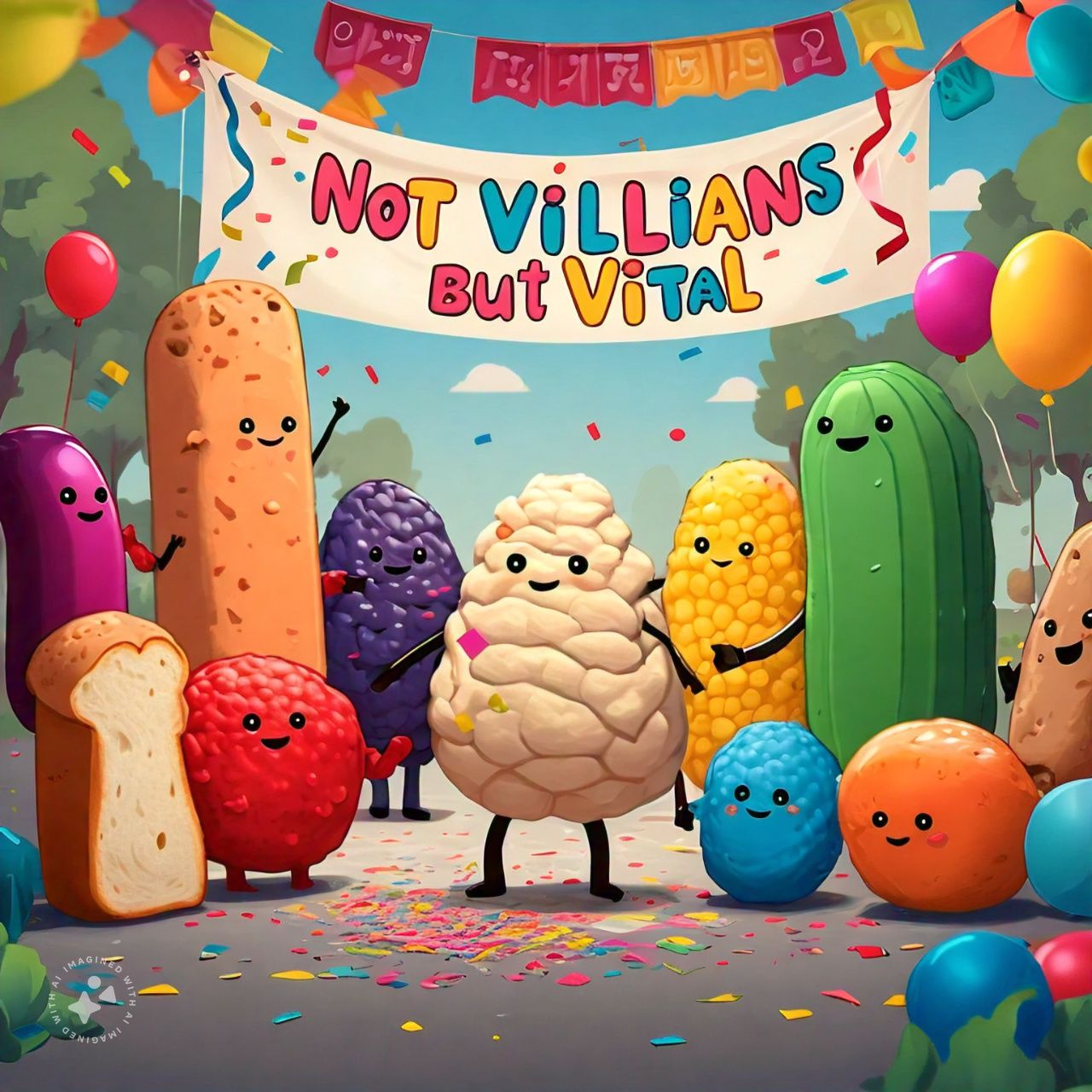CARBOHYDRATES: NOT VILLAINS, BUT VITAL

WHAT ARE CARBOHYDRATES?
Carbohydrates are defined as polyhydroxy aldehydes or ketones or substances that produce such compounds when hydrolyzed. Now, this is a scientific definition. In simpler terms, Carbohydrates are one of the major macronutrients along with Proteins and Fats.
IS CARBOHYDRATE A VILLLIAN?
Nowadays, people misunderstood carbohydrates as an enemy of healthy diet. We considered Carbohydrates as dietary villains. We often blame them for weight gain, diabetes and other health issues. But the truth is that Carbohydrates are vital source of energy and plays a vital role in overall health. We can realize the importance of Carbohydrates only when we understand the science behind Carbohydrates.
THE ROLE OF CARBOHYDRATES
- Carbohydrates are one of the three macronutrients essential to human health, along with proteins and fats.
- They are body’s main source of energy, specially for the brain and muscles during physical activity.
- Carbohydrates are broken down into glucose, which is used by cells for energy or stored in the liver and muscles as glycogen for later use.
- This process is critical for maintaining energy levels and supporting bodily functions.
TYPES OF CARBOHYDRATES
Carbohydrates can be broadly categorized into Simple and Complex Carbohydrates.
- Simple Carbohydrates are quickly digested and can cause rapid spikes in blood sugar levels. They are found in foods like sugar, honey, and fruit juice.
- Complex Carbohydrates are digested more slowly, providing a steady release of energy and keeping blood sugar levels stable. They are found in whole grains, vegetables and legumes.
HEALTH BENEFITS OF CARBOHYDRATES

When consumed as a part of a balanced diet, Carbohydrates offer numerous health benefits:
- PROMOTES ENERGY: Carbohydrates are crucial for physical and mental performance as the body’s primary energy source. Athletes, in particular, rely on glycogen stores for sustained energy during intense exercise.
- SUPPLY NUTRIENTS: Many Carbohydrate-rich foods are also rich in essential nutrients. Whole grains, fruits and vegetables provide vitamins, minerals, fiber and antioxidants that are vital for overall health.
- IMPROVES DIGESTION: Dietary fiber, a type of carbohydrate found in plant-based foods, is essential for digestive health. It helps maintain bowel regularity, prevents constipation and can reduce the risk of developing certain digestive disorders.
- PREVENTS CHRONIC DISEASES: Consuming a diet high in whole grains and fiber is associated with a lower risk of chronic diseases such as heart diseases, type 2 diabetes, and certain cancers. These foods regulate blood sugar levels and improve cholesterol profiles.
- PROTEIN SPARING EFFECT: Carbohydrates helps in regulating the protein metabolism. Presence of sufficient carbohydrates to meet energy demands prevents the channeling of too much protein for this purpose. This protein sparing action allows the major portions of protein to be used for its basic structured purpose of tissue building.
- ANTIKETOGENIC EFFECT: Presence of carbohydrates is necessary for normal fat metabolism. In the absence of sufficient carbohydrates, larger amounts of fats are used for energy than the body is equipped to handle. This results in incomplete oxidation and accumulation of ketone bodies. This may in turn leads to acidosis, sodium imbalance and dehydration.
- EXCRETION OF TOXINS: Glucuronic acid, a metabolite of glucose, combines with chemical and bacterial toxins and some normal metabolites in the liver and thereby helps in their excretion.
MISCONCEPTIONS AND MODERN DIETS
The villain nature of carbohydrates is also glorified partly due to the popularity of low-carb diets like Ketogenic and Atkins diets, which emphasize high protein and fat intake while minimizing carbs. While these diets can lead to short-term weight loss, they often do so at the expense of long-term health. Severely restricting carbohydrates can lead to nutrient deficiencies, reduced fiber intake, and negative impact on heart health. Moreover, the problem often lies not with carbohydrates themselves but with the types of carbohydrates people consume. Highly processed foods, sugary snacks, and refined grains lack the nutritional benefits of whole, unprocessed carbohydrates sources. By focusing on quality over quantity, individuals can enjoy the benefits of carbohydrates without the associated risks.
CONCLUSION
Carbohydrates are not villains. They are crucial part of a balanced and healthy diet. Understanding the difference between simple and complex carbohydrates and choosing nutrient-rich sources can help dispel the myth that all carbohydrates are bad. By including whole grains, fruits, vegetables, and legumes in our diet we can harness the power of carbohydrates to fuel our bodies, support our health, and enhance our well- being. Its time to give carbohydrates the credit they deserve and recognize their vital role in our nutrition.
SO,
CARBOHYDRATES ARE NOT VILLAIN
CARBOHYDRATES ARE VITAL
« Impact of glycemic response of Rice | IMPORTANCE OF BALANCED DIET OVER HIGH PROTEIN DIET »